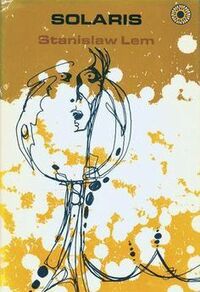Take a photo of a barcode or cover
mysterious
reflective
tense
fast-paced
Plot or Character Driven:
A mix
Strong character development:
No
Loveable characters:
Complicated
Diverse cast of characters:
Complicated
Flaws of characters a main focus:
Yes
fast-paced
3.5, rounded up.
At times beautifully mad, at others maddeningly obscure, this slim volume contains far more substance than one might think by looking. Kris, our protagonist, is an apt conduit for our journey into the surreality of Solaris; and while I found some of his choices and loyalties logically questionable, none of them felt ridiculous. When in an isolated whirlpool of interstellar mental breakdown, one tends to do things perhaps a little differently.
What could have improved this classic space/contact tale is a culling of Kris’s reading habits. I can recall two lengthy sections wherein we’re treated to the narrator summarizing whole works on the planet Solaris—books by previous voyagers and theorists, all with their own desperate ideas for what the heck might be going on. It all rang very dull to me, and had me skimming like I was back in school. Related to this was the author’s habit of trying to describe seemingly indescribable formations on the surface of Solaris: great towers and trees, “mimoids,” funnels, etc. were common finds here. Yet all of these highly visual entities repeatedly struggled to translate well onto the written page, leaving my mind blundering about as it tried to form a picture.
Additionally, I feel that the tale of Solaris (the planet and entity) was left far from finished. The book simply... ends, with events ahead and an awful lot of questions yet to answer. I don’t think that every mystery presented in a story should be answered, as there can be more power in suggestion than revelation; but here, I was left genuinely in need of explanations. Beyond the mysteries, the longterm experience of Humans and Solaris clearly had much left to accomplish, and it would have been fascinating to see what that might entail.
Finally, there are doses of racism and sexism here. The only person of color (a woman) is referred to with an awfully outdated and offensive term, and is described in a “tribal” manner. The only other woman, who is presumed white, is all wrapped up in an inseparable patriarchal bond, and is repeatedly presented as beautiful/pure/dumb/useless/tragic. Good to know going in, I’d think.
I’m glad I read this but don’t see myself returning to it. At times very enjoyable, at others as thick as the sludge on Solaris itself, it was a mixed bag with mixed returns. Still, it did its job in making me wonder at the stars a little longer every time I look up.
At times beautifully mad, at others maddeningly obscure, this slim volume contains far more substance than one might think by looking. Kris, our protagonist, is an apt conduit for our journey into the surreality of Solaris; and while I found some of his choices and loyalties logically questionable, none of them felt ridiculous. When in an isolated whirlpool of interstellar mental breakdown, one tends to do things perhaps a little differently.
What could have improved this classic space/contact tale is a culling of Kris’s reading habits. I can recall two lengthy sections wherein we’re treated to the narrator summarizing whole works on the planet Solaris—books by previous voyagers and theorists, all with their own desperate ideas for what the heck might be going on. It all rang very dull to me, and had me skimming like I was back in school. Related to this was the author’s habit of trying to describe seemingly indescribable formations on the surface of Solaris: great towers and trees, “mimoids,” funnels, etc. were common finds here. Yet all of these highly visual entities repeatedly struggled to translate well onto the written page, leaving my mind blundering about as it tried to form a picture.
Additionally, I feel that the tale of Solaris (the planet and entity) was left far from finished. The book simply... ends, with events ahead and an awful lot of questions yet to answer. I don’t think that every mystery presented in a story should be answered, as there can be more power in suggestion than revelation; but here, I was left genuinely in need of explanations. Beyond the mysteries, the longterm experience of Humans and Solaris clearly had much left to accomplish, and it would have been fascinating to see what that might entail.
Finally, there are doses of racism and sexism here. The only person of color (a woman) is referred to with an awfully outdated and offensive term, and is described in a “tribal” manner. The only other woman, who is presumed white, is all wrapped up in an inseparable patriarchal bond, and is repeatedly presented as beautiful/pure/dumb/useless/tragic. Good to know going in, I’d think.
I’m glad I read this but don’t see myself returning to it. At times very enjoyable, at others as thick as the sludge on Solaris itself, it was a mixed bag with mixed returns. Still, it did its job in making me wonder at the stars a little longer every time I look up.
I cant quite understand the point of this book. Why it’s considered to be so “great” is beyond me. None of the themes be it existential dread, extraterrestrial life, ghosts of the past etc, were particularly fleshed out. Even the whole ocean thing??? The best way used to describe it was sentient space jelly??? How unimaginative.
All this book really is about the guy being obsessed with his ex and having a hard time letting go of her. Even the science-y bits seemed stupid. Also why does no one talk about the obvious racist tone within the book. On god there are better books than this to read. This was an unfunny, flat piece of uninteresting garbage.
All this book really is about the guy being obsessed with his ex and having a hard time letting go of her. Even the science-y bits seemed stupid. Also why does no one talk about the obvious racist tone within the book. On god there are better books than this to read. This was an unfunny, flat piece of uninteresting garbage.
A little odd in parts, but overall pretty thought-provoking. For a 50-year-old book, it holds up really well. (A few references to "microfilm", plus the subtle lack of any digital technologies on a futuristic spacecraft, were the only things that really clued you that this wasn't written recently.... :)
I hadn't read Solaris, and considering that Soderbergh's 2002 version taken from the book is one of my favorite films, I figured why not. Despite many many pages of paragraphs seemingly without end on the nature of the planet and what the intelligence actually is, the book was enjoyable, and I found many instances where the dialogue was verbatim between Kelvin and the other characters, to my delight. So ultimately my feelings are if you can sludge through the scientific dissertation on the planet and it's structure and behavior, you'll find your way to a really great story about what it is to be human.
adventurous
dark
mysterious
reflective
tense
medium-paced
Plot or Character Driven:
A mix
Strong character development:
Yes
Loveable characters:
Complicated
Diverse cast of characters:
N/A
Flaws of characters a main focus:
Yes
Some interesting themes, but didn’t end up resonating with me overall. Dragged on unnecessarily in places.
adventurous
dark
mysterious
reflective
medium-paced
Plot or Character Driven:
A mix
Strong character development:
No
Loveable characters:
No
Diverse cast of characters:
No
Flaws of characters a main focus:
Complicated
Even in space dudes be dishonest with other dudes and be lying to their extraterrestrially reborn dead girlfriends.
challenging
emotional
mysterious
reflective
slow-paced
Plot or Character Driven:
Character
Strong character development:
Yes
Loveable characters:
No
Diverse cast of characters:
No
Flaws of characters a main focus:
Yes






